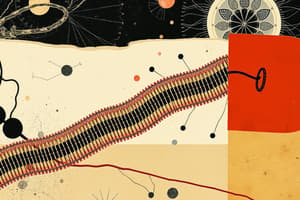Podcast
Questions and Answers
What is the main function of the mitochondria in a cell?
What is the main function of the mitochondria in a cell?
- To store genetic material
- To generate energy for the cell (correct)
- To regulate what enters and leaves the cell
- To synthesize proteins
What type of transport requires energy and moves molecules against their concentration gradient?
What type of transport requires energy and moves molecules against their concentration gradient?
- Passive transport
- Osmosis
- Diffusion
- Active transport (correct)
What is the process by which cells become specialized to perform specific functions?
What is the process by which cells become specialized to perform specific functions?
- Cell division
- Gene expression (correct)
- Mitosis
- Meiosis
What is the term for the study of the evolutionary relationships between organisms?
What is the term for the study of the evolutionary relationships between organisms?
What is the term for the living organisms that make up an ecosystem?
What is the term for the living organisms that make up an ecosystem?
What is the term for the process by which the body maintains a stable internal environment despite changes in the external environment?
What is the term for the process by which the body maintains a stable internal environment despite changes in the external environment?
Flashcards are hidden until you start studying
Study Notes
Cellular Biology
- Cell Structure:
- Cell membrane: semi-permeable, regulates what enters/leaves cell
- Cytoplasm: jelly-like substance inside cell membrane
- Nucleus: contains genetic material (DNA)
- Mitochondria: generate energy for cell (ATP)
- Endoplasmic Reticulum (ER): transports proteins, lipids
- Ribosomes: site of protein synthesis
- Cellular Transport:
- Passive transport: diffusion, osmosis
- Active transport: energy required, against concentration gradient
- Cell Division:
- Mitosis: cell division, identical daughter cells
- Meiosis: cell division, gamete formation (sperm, egg cells)
Genetics
- Inheritance Patterns:
- Autosomal dominant/recessive traits
- Sex-linked traits (X/Y chromosomes)
- DNA Structure and Function:
- Double helix model
- DNA replication: semi-conservative
- Gene expression: transcription, translation
- Genetic Variation:
- Mutations: changes in DNA sequence
- Genetic variation: heritable differences between individuals
Evolution
- Evolution Principles:
- Natural selection: adaptation, survival, reproduction
- Speciation: formation of new species
- Fossil Record:
- Evidence for evolution: fossil record, comparative anatomy
- Phylogeny:
- Study of evolutionary relationships between organisms
- Phylogenetic trees: illustrate evolutionary history
Ecosystems
- Ecosystem Components:
- Biotic factors: living organisms
- Abiotic factors: non-living components (temperature, light, water)
- Energy Flow:
- Producers: autotrophs (plants, algae)
- Consumers: heterotrophs (herbivores, carnivores, omnivores)
- Decomposers: break down organic matter
- Ecological Relationships:
- Symbiosis: mutualism, commensalism, parasitism
- Predation, competition, cooperation
Human Physiology
- Organ Systems:
- Nervous system: control, coordination
- Circulatory system: blood circulation, gas exchange
- Respiratory system: gas exchange
- Body Systems Interactions:
- Homeostasis: maintaining internal balance
- Negative feedback mechanisms: regulation of body functions
Studying That Suits You
Use AI to generate personalized quizzes and flashcards to suit your learning preferences.




